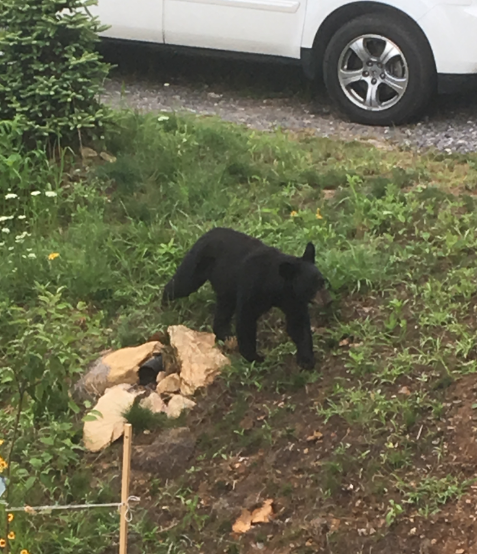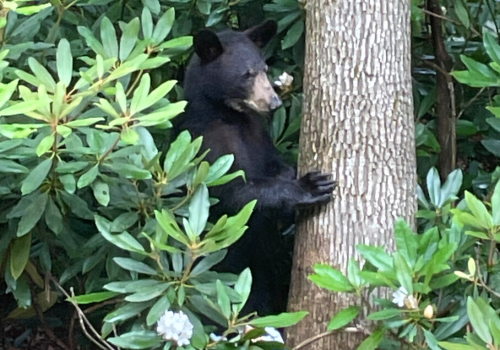Black bear sightings are becoming more commonplace in the Asheville area, and the sightings tend to increase between the spring and summer months and can extend into the fall. While they can be a scenic sight, strolling down trails and paths, the NC Wildlife Resources Commission recommends keeping a distance and giving bears plenty of space.
Bears tend to find homes or dens in hollow trees, fallen trees, excavated mounds or ‘nests’, and large sections of briar patches. While a bear will share their space with other bears, males tend to have larger “home ranges” which can total up to 300 square miles whereas females will typically not venture over 50 square miles.

A bear sighting at Almost Bearadise.
A bear’s sense of smell is impeccable, seven times better than a bloodhound, and they can smell a human scent, burgers on the grill, and berries a mile away. With that being said, bears eat a lot. They spend the winter months in torpor or a time of lowered physical activity. When springtime comes again, they spend up to 20 hours a day eating and have been known to put on up to 100 pounds in a few weeks of time. Bears are omnivores. During the spring they will eat mostly plants, but as summer brings berries, nuts, and insects, the bears begin to feast on those as well. They will also eat small mammals, birds, reptiles, and amphibians.
With bear’s large appetites, it’s helpful to keep in mind that as the season continues on, it’s not uncommon for them to come down from the mountainous wilderness areas into town in search of trash and loose food. For this reason, we ask all guests to secure trash and food either in the house until trash day or in secured locking metal bear containers if these are supplied at the home.
Black bears are generally not aggressive, but they can be protective when they feel threatened, particularly if they are with their cubs. You may encounter a bear outside your vacation home, especially if the home is off the beaten path. This can be really exciting, and even with all of our bear sightings we still get just as excited about it as our guests. With that being said, it is very important to keep a safe distance from bears so that they don’t feel threatened.
Here are some other tips from the BearWise organization for living in close range to bear activity.
- Never feed or approach bears
- Secure food, garbage, and recycling
- Remove bird feeders when bears are active
- Never leave pet food outside
- Clean and store grills
- Let neighbors know if you spot a bear so they won’t be surprised
What do I do if I encounter a bear while hiking?
Black bear attacks are very uncommon, and generally, they really would prefer to steer clear of areas where they sense human activity. They are generally very timid. It is very rare that you will encounter them in close quarters. If you do encounter a bear while hiking or in close proximity, it is important to not approach the bear and quietly move away or leave the area. Always allow a clear escape route for the bear (don’t corner it).

Black Bear spotted on Church St in downtown Black Mountain.
Here are some other ways to avoid bears while hiking:
- Always keep your dogs on a leash.
- Hike in groups
- Be aware of your surroundings
- Make noise in thicker cover
The BearWise organization offers some other excellent advice for being safe around bears that can be accessed here.
While bears can be intimidating to some, they really are majestic creatures and as long as you respect their space and admire them from a distance (don’t feed, try to pet them!), it can be a really great experience to see a bear and add to the excitement of your vacation. We are always amazed at how many guest reviews we receive that mention exciting bear sightings.
